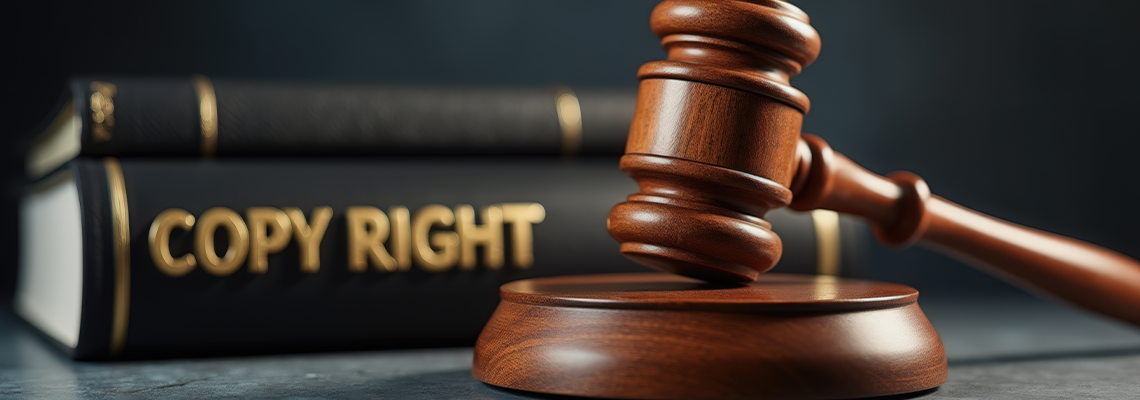
Creative work needs strong protection to prevent unauthorized use or copying. Copyright provides basic rights automatically, but copyright registration adds important legal advantages. It creates a public record of ownership and can make it easier to enforce your rights if needed. Knowing how to register can help you protect what you create.
At Keough Law, PLLC in Orlando, Florida, we help clients protect their creative works through clear, straightforward guidance. Our firm focuses on copyright registration and related legal matters to support creators like you. We know how valuable your work is and offer support to keep it secure.
What Copyright Protects and What It Doesn’t
Copyright protects original works fixed in a tangible form, like books, music, paintings, and software. It covers the expression of ideas, not the ideas themselves. For example, concepts, titles, and methods can’t be copyrighted. Understanding these limits helps creators know what qualifies for copyright registration.
Creators sometimes confuse protected elements with those that are excluded. This distinction is important when deciding whether to pursue registration. With a clearer understanding, creators can focus their efforts on protecting what truly qualifies under copyright law. Next, it’s helpful to address some common misconceptions about copyright.
Common Misconceptions About Copyright Protection
Many creators think their work is fully protected once created, but registration adds important legal benefits. Some try mailing themselves a copy to prove ownership. However, courts don’t accept this as reliable compared to official copyright registration. Relying on informal methods can leave your rights vulnerable if infringement occurs.
Misunderstandings can lead to missed opportunities for stronger protection. I know from experience that creators often overlook how crucial registration can be when legal challenges arise. Registration is neither complicated nor prohibitively expensive, making it accessible for most creators. These facts lead directly to the real benefits of registering your copyright.
Benefits of Registering Your Copyright
Registering your copyright creates a public record of ownership, which is essential if you need to enforce your rights later. Registration is required to file a federal lawsuit for infringement and allows for potential statutory damages and attorney’s fees, which can make legal action more feasible. Without registration, you may have fewer options to protect your work effectively.
Key benefits of registering your copyright include:
Public record of ownership: Registration creates an official record that establishes who owns the work. This record is publicly accessible, which can deter infringement by clearly showing your claim. It also helps resolve disputes by providing clear evidence of ownership if questions arise.
Ability to file lawsuits: Registration is required before you can file a lawsuit for copyright infringement in federal court. Without it, you may not have the legal standing to pursue claims against unauthorized use. Having a registered copyright strengthens your position when enforcing your rights through the courts.
Access to statutory damages: Registered works can qualify for statutory damages, which provide financial compensation beyond actual losses. This can make enforcement more effective, especially when actual damages are hard to prove. These damages also serve as a deterrent against potential infringers considering unauthorized use.
These benefits show that registration is more than just a formality, it can be a vital legal tool. Knowing these benefits highlights why taking action to secure your rights is so important.
How to Register Copyright With the U.S. Copyright Office
The registration process is straightforward and designed to accommodate creators with varying levels of experience. To begin, you complete an application form specific to your type of work, submit a copy of the work, and pay a filing fee. Many creators find it easier and faster to register online, though mail submissions remain an option.
The U.S. Copyright Office reviews the materials and, if everything is in order, issues a certificate of registration. Processing times vary but generally take several months. By understanding this process, creators can avoid common pitfalls that delay registration or cause rejections. Timing your registration is another important consideration.
Choosing the Right Time to Register Your Work
The timing of your copyright registration affects the protections available to you. Registering before or within three months of publication maximizes your eligibility for statutory damages and attorney’s fees. Delaying registration may limit your ability to recover these remedies if infringement occurs.
Deciding whether to register individual works or a collection depends on your situation. When multiple unpublished works share a common author and are submitted together, registration may be combined. However, published works generally require individual registration. Knowing when to register helps protect your rights proactively.
What Happens After You Register Your Work
Once your registration is complete, you’ll receive a certificate confirming your claim to the work. This certificate serves as important legal evidence if infringement occurs. However, registration doesn’t automatically monitor or prevent unauthorized use; you remain responsible for policing your rights.
According to the U.S. Copyright Office, registration lasts for the author’s life plus 70 years in most cases, providing long-term protection. Proper storage of your certificate and maintenance of records help make sure you can prove ownership if needed. With this foundation, registration supports enforcement efforts when protecting your creative work.
How Copyright Registration Supports Enforcement and Legal Action
Registration is necessary before filing a copyright infringement lawsuit in federal court. A timely registration certificate provides strong evidence of ownership and can make the difference in court. It also allows you to seek statutory damages and attorney’s fees, which can make legal action more financially viable.
Without registration, creators have limited options for enforcing their rights in court. We at Keough Law, PLLC, have seen how early registration can simplify the legal process and strengthen a client’s position. The ability to enforce your rights depends greatly on completing registration correctly and promptly.
Special Considerations for Joint Works and Works Made for Hire
When multiple authors create a work together, it’s important that the copyright registration reflects all contributors. Joint authors share equal rights unless they agree otherwise, and registration can clarify ownership. Conversely, works made for hire belong to the employer or commissioning party, not the individual creator.
Understanding these distinctions helps prevent ownership disputes. Proper registration documentation supports clear legal rights for all parties involved. This knowledge is especially important as more creative works are produced in collaborative or commissioned settings.
Copyright Registration for Digital Content and Online Creators
Digital content such as blogs, videos, software, and social media posts qualify for copyright protection. Registration helps online creators establish legal ownership in an environment where copying is easy and widespread. Because digital works are often published quickly, it’s critical to maintain detailed records for registration purposes.
Digital creators should pay attention to the appropriate category for registration and act promptly to protect their content. Keeping draft copies, publication dates, and version histories can support your claim. These steps make copyright registration a powerful tool for protecting creative work in the digital age.
Contact Us Today
At Keough Law, PLLC, we proudly serve clients throughout Orange County, Osceola County, Hillsborough County, and Pinellas County, including Orlando, Florida, and the surrounding areas. Attorney Shaun Keough understands how important copyright registration is to safeguarding your creative work and stand ready to guide you through the process. Contact us today to discuss how we can assist you.



